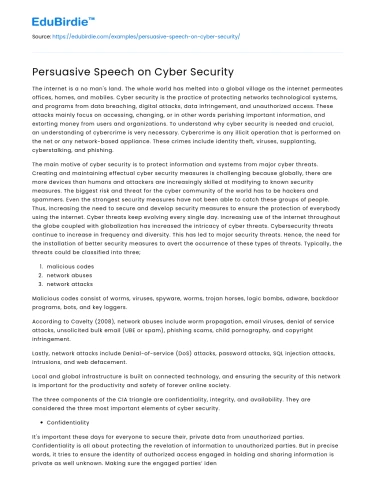The internet is a no man's land. The whole world has melted into a global village as the internet permeates offices, homes, and mobiles. Cyber security is the practice of protecting networks technological systems, and programs from data breaching, digital attacks, data infringement, and unauthorized access. These attacks mainly focus on accessing, changing, or in other words perishing important information, and extorting money from users and organizations. To understand why cyber security is needed and crucial, an understanding of cybercrime is very necessary. Cybercrime is any illicit operation that is performed on the net or any network-based appliance. These crimes include identity theft, viruses, supplanting, cyberstalking, and phishing.
The main motive of cyber security is to protect information and systems from major cyber threats. Creating and maintaining effectual cyber security measures is challenging because globally, there are more devices than humans and attackers are increasingly skilled at modifying to known security measures. The biggest risk and threat for the cyber community of the world has to be hackers and spammers. Even the strongest security measures have not been able to catch these groups of people. Thus, increasing the need to secure and develop security measures to ensure the protection of everybody using the internet. Cyber threats keep evolving every single day. Increasing use of the internet throughout the globe coupled with globalization has increased the intricacy of cyber threats. Cybersecurity threats continue to increase in frequency and diversity. This has led to major security threats. Hence, the need for the installation of better security measures to avert the occurrence of these types of threats. Typically, the threats could be classified into three;
Save your time!
We can take care of your essay
- Proper editing and formatting
- Free revision, title page, and bibliography
- Flexible prices and money-back guarantee
- malicious codes
- network abuses
- network attacks
Malicious codes consist of worms, viruses, spyware, worms, trojan horses, logic bombs, adware, backdoor programs, bots, and key loggers.
According to Cavelty (2008), network abuses include worm propagation, email viruses, denial of service attacks, unsolicited bulk email (UBE or spam), phishing scams, child pornography, and copyright infringement.
Lastly, network attacks include Denial-of-service (DoS) attacks, password attacks, SQL injection attacks, intrusions, and web defacement.
Local and global infrastructure is built on connected technology, and ensuring the security of this network is important for the productivity and safety of forever online society.
The three components of the CIA triangle are confidentiality, integrity, and availability. They are considered the three most important elements of cyber security.
It's important these days for everyone to secure their, private data from unauthorized parties. Confidentiality is all about protecting the revelation of information to unauthorized parties. But in precise words, it tries to ensure the identity of authorized access engaged in holding and sharing information is private as well unknown. Making sure the engaged parties’ identity is confidential just completes the CIA triad. Protecting confidentiality is subjected to having to determine and accomplish secure access levels for data.
Several frequent means that are used to handle confidentiality involve volume & file encryptions and access control lists.
It maintains the authenticity of data over its complete life cycle by ensuring the unauthorized party is not able to interfere or tamper with it. This is a major element of the CIA Triad. It makes sure when an authorized person modifies information that shouldn’t have been modified, the loss can be managed. It also makes sure that information is not breached due to unintentional hardware or software malfunctions. Standard efforts to assure integrity comprise cryptographic checksums, access controls, backups, and uninterrupted power supplies
This is the last element and it speaks about the availability of your information. In rigorous terms, it facilitates the condition where authorized participants are able to access the data whenever required. Access channels, systems, and authentic devices all must work adequately for the data they protect and make sure it's accessible when it‘s needed. Information unavailability is a result of malicious activities like DDoS attacks or software/hardware failure or insufficiency of bandwidth or other resources.
Therefore, the three main goals of the CIA Triad of Security are-
- Keeping sensitive information secure and private.
- Having the ability to recover data that has been damaged, lost, or compromised.
- Ensuring authorized users can freely access the systems, networks, and data needed to perform their daily tasks.
References:
- Goutam, R. K. (2015). Importance of Cyber Security. International Journal of Computer Applications
- Myriam Dunn Cavelty (2008). Cyber-Security and Threat Politics.
- Singer, P. (2014). What Do We Mean By Security Anyway? Brookings Institution.






 Stuck on your essay?
Stuck on your essay?

